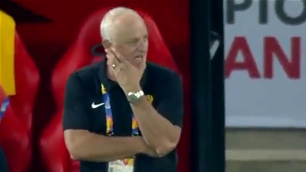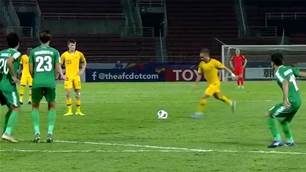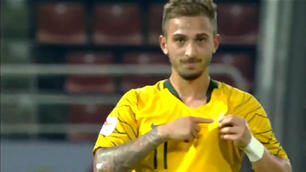Football, and the on-going success of Iraq at the Asian Cup, can play a major role in giving the country a more positive future believes Hussein Saeed, the nation's football federation president.
The Iraqis play in the Asian Cup final for the first time on Sunday when they take on three-time champions Saudi Arabia, a remarkable achievement for a country that has been torn apart by violence since the American-led invasion in February 2003.
After more than four years of occupation and a bitter insurgency that continues to lead a drift towards civil war, Iraq's performance at the 16-team continental championship is little short of staggering.
Before overcoming South Korea in the semi-finals, the Jorvan Vieira-coached team defeated Australia in the group stages and Vietnam in the quarter-finals to record their best-ever showing in the competition.
And Saeed believes the performance of the team is an example of what the people of Iraq can do if they pull together in the same direction.
"We want to give a good example for the politicians and for the people that when we are united and working together - like the federation, the coach and the players - we can win against all the difficulties we face," Saeed, a former Iraq international, said.
"We face many problems with the security and the political situation is not good but we do the best we can and it is very, very important for our people and this team is giving a good impression to the people back in Iraq.
"Everyday we hear about car bombings or so many people being killed but I think this team is a good thing for our people. Football is sending a good message to all the people about friendship and everything else."
Success under the most trying of circumstances is nothing new for the Iraqis. In 2004 - just a year after the invasion - the nation's under 23 team reached the semi-finals of the Olympic Games, the first Asian nation to do so since Japan won the bronze medal at the 1968 Games in Mexico City.
Much of that team forms the basis for the one currently in South East Asia but while there has been much speculation over the racial make-up of the team, Saeed and everyone associated with the team believe ethnicity of the players is not important.
"We don't know who is Sunni and who is Shia in our team," said Saeed. "And it's the same with the fans, we don't know who is Sunni and who is Shia and we don't care.
"The fans love Iraq and I think Iraqis are united under two things; one is the Iraqi flag and the other is the Iraqi football team. This is very important."
The on-going violence, however, has had an impact on the team.
Goalkeeper Noor Sabri, who played a key role in his team's penalty shootout win over South Korea in the semi-finals, lost his brother-in-law just before the tournament started while the step-mother of midfielder Hawar Mulla Mohammed was also killed in the days leading up to the competition.
Employees of the federation have also been killed and injured in the violence which continues to claim scores of casualties daily.
"We have lost many people," said Saeed. "The physiotherapist for the Iraq national team, before we came to the Asian Cup, he was killed in Baghdad in a car bombing when he was going to pick up medicine from the pharmacy, so we have lost many people, sportsmen and others.
"But we want to prove to the people that we can overcome the problems and send a message to the political parties and all the other people. We want them to know that you can do many things when you are united."
What makes the team's success all the more astonishing is the lack of financial assistance they have received from the Iraqi government or the administrations behind the occupation.
Sponsors are almost impossible to find for the federation while the security situation means the team must play their home games outside Iraq, which puts an additional financial burden on the association.
FIFA, the game's governing body, and the Asian Football Confederation provide some assistance while the generosity of other federations allows the Iraqis to be able to compete in and prepare for tournaments around the region.
But while the financial burden is taking its toll and the violence looks unlikely to relent in the near future, Saeed remains optimistic.
"Football is the hope for the people in Iraq and when you care about football we can decrease the violence in Iraq," he said.
"When the football team is playing there is no bombing in Iraq because all the people are going to watch the game and that is a message for the politicians. It is important to help the players, to help the team."
After more than four years of occupation and a bitter insurgency that continues to lead a drift towards civil war, Iraq's performance at the 16-team continental championship is little short of staggering.
Before overcoming South Korea in the semi-finals, the Jorvan Vieira-coached team defeated Australia in the group stages and Vietnam in the quarter-finals to record their best-ever showing in the competition.
And Saeed believes the performance of the team is an example of what the people of Iraq can do if they pull together in the same direction.
"We want to give a good example for the politicians and for the people that when we are united and working together - like the federation, the coach and the players - we can win against all the difficulties we face," Saeed, a former Iraq international, said.
"We face many problems with the security and the political situation is not good but we do the best we can and it is very, very important for our people and this team is giving a good impression to the people back in Iraq.
"Everyday we hear about car bombings or so many people being killed but I think this team is a good thing for our people. Football is sending a good message to all the people about friendship and everything else."
Success under the most trying of circumstances is nothing new for the Iraqis. In 2004 - just a year after the invasion - the nation's under 23 team reached the semi-finals of the Olympic Games, the first Asian nation to do so since Japan won the bronze medal at the 1968 Games in Mexico City.
Much of that team forms the basis for the one currently in South East Asia but while there has been much speculation over the racial make-up of the team, Saeed and everyone associated with the team believe ethnicity of the players is not important.
"We don't know who is Sunni and who is Shia in our team," said Saeed. "And it's the same with the fans, we don't know who is Sunni and who is Shia and we don't care.
"The fans love Iraq and I think Iraqis are united under two things; one is the Iraqi flag and the other is the Iraqi football team. This is very important."
The on-going violence, however, has had an impact on the team.
Goalkeeper Noor Sabri, who played a key role in his team's penalty shootout win over South Korea in the semi-finals, lost his brother-in-law just before the tournament started while the step-mother of midfielder Hawar Mulla Mohammed was also killed in the days leading up to the competition.
Employees of the federation have also been killed and injured in the violence which continues to claim scores of casualties daily.
"We have lost many people," said Saeed. "The physiotherapist for the Iraq national team, before we came to the Asian Cup, he was killed in Baghdad in a car bombing when he was going to pick up medicine from the pharmacy, so we have lost many people, sportsmen and others.
"But we want to prove to the people that we can overcome the problems and send a message to the political parties and all the other people. We want them to know that you can do many things when you are united."
What makes the team's success all the more astonishing is the lack of financial assistance they have received from the Iraqi government or the administrations behind the occupation.
Sponsors are almost impossible to find for the federation while the security situation means the team must play their home games outside Iraq, which puts an additional financial burden on the association.
FIFA, the game's governing body, and the Asian Football Confederation provide some assistance while the generosity of other federations allows the Iraqis to be able to compete in and prepare for tournaments around the region.
But while the financial burden is taking its toll and the violence looks unlikely to relent in the near future, Saeed remains optimistic.
"Football is the hope for the people in Iraq and when you care about football we can decrease the violence in Iraq," he said.
"When the football team is playing there is no bombing in Iraq because all the people are going to watch the game and that is a message for the politicians. It is important to help the players, to help the team."
Copyright (c) Press Association
Related Articles

Champs and Chumps: Who impressed for the Olyroos?

Watch! Reno Piscopo lands stunner in Olyroos draw













